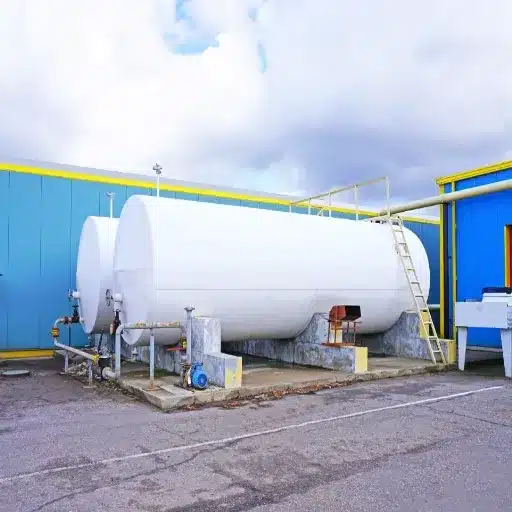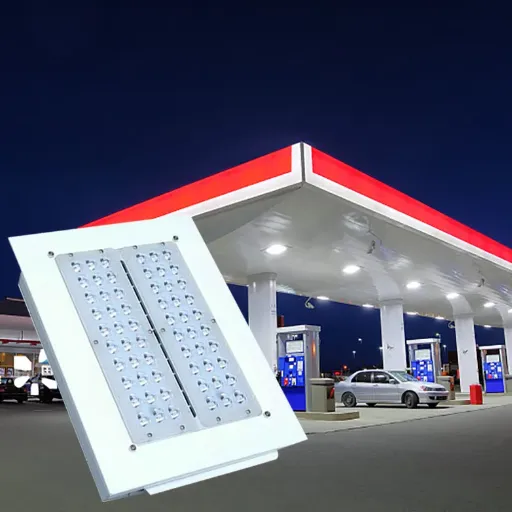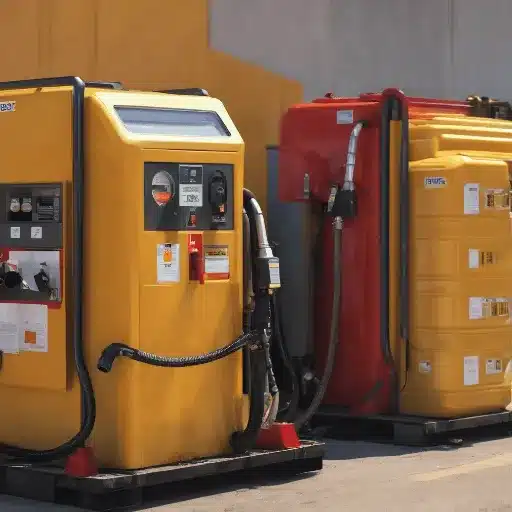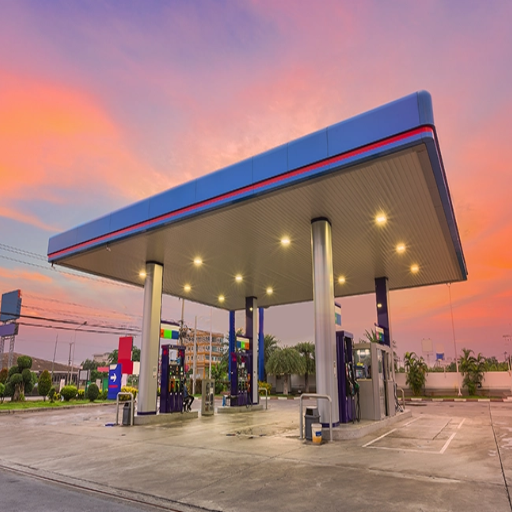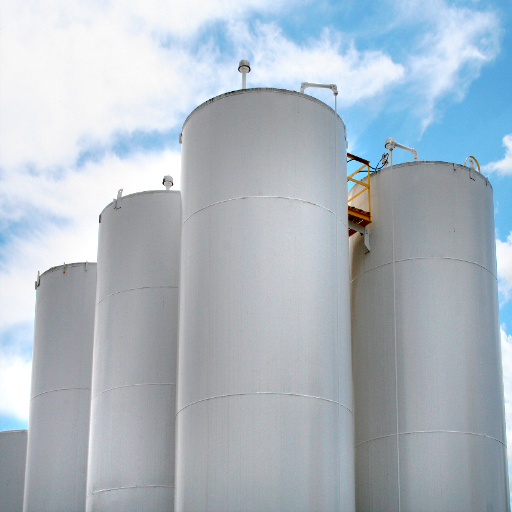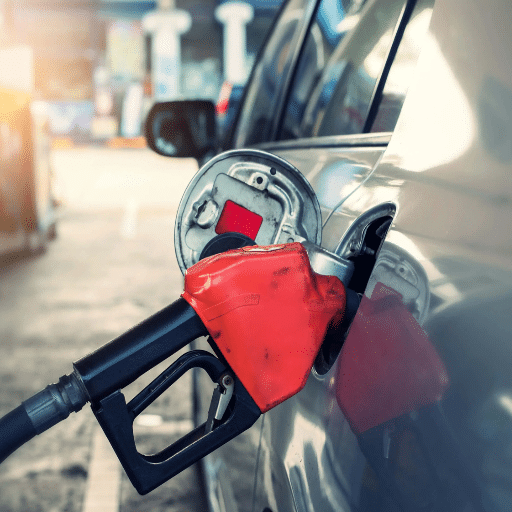While fetching fuel for your vehicle, your own experience might have made you aware that gasoline is nothing but one product with multiple grades. Across the United States, transporter gasoline is a convenient sight. But how good is their fuel? Consistent performance, better maintenance of your engine, or higher mileage- your experience on the road matters tremendously because of the gas you have in your car. This article provides insight into mobile gas and its reliability, efficiency, and properties that differentiate it, and it might or might not be worthy of the Mobile Gas name. Have you been mulling over whether Mobile gas is best for your car? Buckle up because you will need that insight to make a worthy decision.
Understanding Mobile Fuel
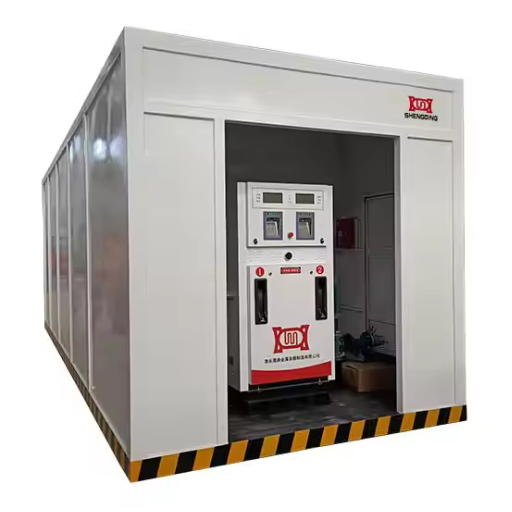
Mobile Fuel strives to deliver consistent performance and engine protection. It contains state-of-the-art additives to chemically reduce deposits, clean the engine, and improve output. A well-trusted brand that supports fuel economy, Mobile Fuel meets stringent quality standards and is compatible with practically all vehicle makes. Perhaps for the everyday commute or the occasional long haul, Mobile fuels offer dependable quality for a smooth run.
What is Mobile Gas?
Mobile gas is a premium fuel formulated to give high engine performance, catering to the various needs that modern cars have. The fuel is enriched with special additives to reduce engine deposits, lower engine wear, and promote cleaner combustion, contributing to longer engine life and higher efficiency. According to industry research, Mobile gas is alleged to reduce emissions and fuel consumption, aligning with the environmental standards and sustainable goals.
Thanks to these new formulations, it is reported that fuels like Mobile gas improve fuel economy by 2-3%, depending heavily on specific driving conditions and types of vehicles. It is said to fit most vehicles, from compacts and sedans to extreme performance engines, and is guaranteed to perform well in any case. On top of that, Mobile gas undergoes extremely rigorous quality testing to ensure consistency and fulfillment of international fuel standards, an assurance of trust that any driver can bank on from any corner of the world. From urban streets to long highway trips, the fuel has become synonymous with reliability and efficiency, promising a smooth driving experience.
Benefits of Using Mobile Fuel
Enhanced Engine Performance: Mobile fuel ensures superb engine efficiency for the used car. During the depositing process, the advanced formula improves combustion and reduces wear on the engine, thus enabling optimum performance under diverse drive scenarios.
Improved Fuel Economy: Mobile fuel’s clean and highly energetic formulation enhances fuel efficiency, thus rewarding cost efficiency. Indeed, tests reveal that the finest fuels, like mobile gas, will increase mileage by 5%, which is a worthy choice for the consumer with a pay-off cost in the long term.
Environmentally Friendly: Mobile fuel supports the global endeavor towards cleaner air. It contains low sulfur and advanced additives that help reduce toxic emissions. Thus, if it conforms to international environmental standards, it produces fewer greenhouse gas emissions.
Consistency in Quality: Mobile Fuel has an international network of stations to adhere to Mobile’s famous high-quality standard, irrespective of where one fuels. Reliably High-quality standards shall be in force for every such driver by strict adherence to international quality control procedures.
Adaptable to Modern Engines: With state-of-the-art technology, Mobile fuel is suitable for modern engine systems, including turbocharged and hybrid vehicles. Thus, it gains operational performance and meets the changing demands of the current automotive industry.
Reliable Supply Chain: Supported by a very efficient distribution chain, Mobile Fuel is guaranteed local and international availability without losing quality. Credibility is paramount to ensure uninterrupted services for the refueling needs of drivers in urban areas and those far away from civilization.
The benefits enable Mobile Fuel to confirm efficient performance, lower cost, and a friendly environment, in response to today’s drivers and organizations that support a healthy environment.
Mobile Fuel vs. Traditional Gasoline
While Mobile Fuel is distinguished from traditional gasoline by several factors, these highlight the advantages of embracing this new fuel generation over conventional fuel. The major one is environmental impact: Mobile Fuel produces fewer carbon emissions, thus equating to the greater global sustainability trend and cleaner alternatives. However, burning traditional gasoline emits heavy quantities of greenhouse gases, aggravating the climate crisis.
Mobile Fuel offers competitive pricing from a cost-benefit perspective due to advanced production techniques and more efficient supply-chain management. If anything, traditional gasoline prices fluctuate quite often because of market instability and dependence on crude oil imports. Predictable price models under Mobile Fuel are thus preferable to the average driver for financial planning and the shadows of price volatility.
Another thing is performance: at the heart of its technology is keeping it clean as it burns so the engine runs efficiently. Engines thus remain in good shape longer, require fewer maintenance interventions, and truly improve other facets of vehicle performance. Meanwhile, traditional gasoline deposits in the engine can, after some time, compromise performance and result in heavy repair costs.
Lastly, accessibility is quickly emerging as an essential factor. Mobile Fuel systems utilise modern logistical innovations to deliver fuel solutions directly to customers and serve an increasing demand in cities and remote locations. In other words, the driver no longer needs to travel to a gas station, which amounts to more convenience and time saved for the driver. At the same time, considering traditional gasoline is readily available, a fixed refueling infrastructure has disadvantages in serving the needs of today’s dynamic consumers.
Considering the environment, cost, performance, and accessibility, Mobile Fuel is a better choice than traditional gasoline when trying to meet the needs of the modern motorist while promoting a greener tomorrow.
Gas Station Insights

Entries of car fuel are serviced by gas stations, which serve as a vital infrastructure. These fuel stations are utilized by car owners for their convenience and are located either along highways or close to cities. The drawbacks of being in a fixed location are inefficiencies, such as long wait times during rush hours or needing to drive out of the way just to refuel. With the rise in mobile fueling and green energy options, traditional fuel stations are challenged, and consumers are looking for convenient and sustainable alternatives. The scenario puts the onus on the traditional stations to align themselves with current times and care for the environment.
Choosing the Right Gas Station
What factors affect choosing a gas station to ensure the best value and experience? Price is often one of the significant factors for many drivers. Studies reveal that drivers can save hundreds of dollars in a year by merely looking for stations with competitive fuel prices. Apps and tools that track local fuel prices will all identify where fuel is cheap in your area.
Convenience is another must-have factor. Stations near major roads or highways and two, multiple pumps cut down the wait, making filling faster. Nowadays, many gas stations might also offer services like car washes, convenience stores, and food, so their customers can do a bunch in one stop.
The quality of the fuel plays an even more critical role. Top-tier stations provide fuel with detergents and additives that are meant to help engine performance and longevity. Choosing stations conforming to fuel quality standards means smooth engine operations and less trouble with maintenance.
Also, sustainability is yet another factor gaining increased preference among consumers. Some stations offer biofuel options and charge sessions for electric vehicles aligned with ecological driving concepts. New stations have been continuing to grow on this front in recent years.
All drivers can make choices that balance cost, convenience, quality, and sustainability by factoring these in.
Mobile Gas Availability at Retailers
Many American retailers also offer mobile gas services, providing more convenience and accessibility to drivers. For instance, major grocery chains such as Walmart and Costco offer fuel services at select sites, with pricing advantages strictly limited to their members. On the other hand, convenience store chains like Wawa and Sheetz are also growing their network of integrated gas stations that offer ways to pay through mobile phones, loyalty awards, and so on.
Studies indicate that location accessibility continues to be a critical consideration when choosing a station. Data suggests that more of these gas stations are now accepting mobile payment technologies such as Apple Pay or Google Pay, making it easier to pay at the pump. Moreover, some areas boast innovative services such as gas delivery apps that allow a refill to be ordered right to the car’s parked location, thereby adding convenience.
For the environmentally conscious, retailers such as Whole Foods have begun providing stations that allow biofuels or electric vehicle charging points alongside traditional gas services. This trend shows increased consumer interest in sustainability, allowing drivers to adapt as automotive technology evolves.
Gas Prices: Mobile vs. Station Prices
Concerning mobile fuel services versus traditional gas stations, it is a matter of convenience and cost. Since mobile fuel services supply the fuel right on the spot where the car is parked, a small premium can be charged for this convenience, especially in urban areas. The convenience fee can climb to $0.15-$0.30 per gallon, depending on the provider or locality.
In contrast, traditional gas stations offer lower basic fuel prices due to buying in bulk and operating cheaply through economies of scale. According to recent data, gas station fuel prices, I recollect, average about $3.85 per gallon for regular unleaded gasoline, with prices varying by state.
However, mobile fueling services may add value through membership discounts, reward programs, or subscription plans that may, over time, balance out the price difference; customers might consider such services for the time saved by eliminating that extra detour or waiting in line. Regarding electric vehicle (EV) drivers, the mobile charging option seldom emerges, with prices set usually per kilowatt hour, slightly higher than public EV charging stations, yet this offers the best on-demand availability.
Understanding these price dynamics helps consumers decide how much they can save or spend on convenience while fueling their cars.
Top Tier Gasoline Explained
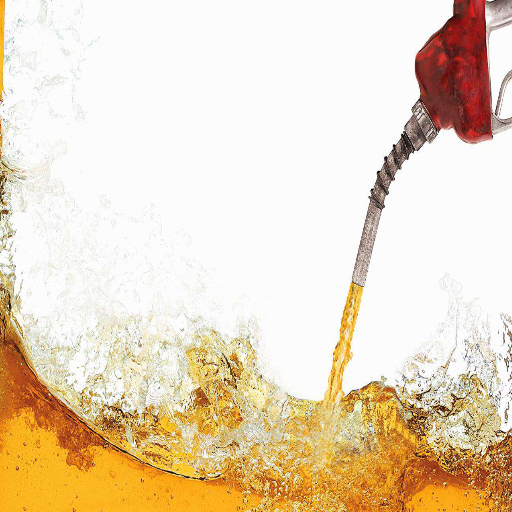
Top Tier gasoline is a high-quality fuel that meets more stringent standards than those for commonly marketed fuels. It contains more detergent additives to clean and protect engine parts from deposit buildup, aiding in better performance. The major automakers recommend it to keep modern engines running at peak efficiency and maintain their longevity. Look for the “Top Tier” certification logo on the station to purchase Top Tier gasoline.
What defines top-tier gas?
Top-tier gasoline meets higher quality standards than the government’s minimum requirements. It contains a stipulated level of detergents and additives that help prevent engine deposits, such as carbon buildup. Based on industry studies, vehicles using fuels meeting Top-Tier standards may realize better engine performance, fuel economy, and reduced emissions over time.
According to the American Automobile Association (AAA) and based on their tests, Top-Tier fuels have about 2.5 times the cleaning additives as market non-certified fuels.
This translates into 19 times fewer intake valve deposits. This gasoline meets the standards, decreasing maintenance costs long-term by keeping the engine clean and well-lubricated.
Many automobile manufacturers, including BMW, General Motors, Toyota, and Audi, endorse Top-Tier fuel. It can be purchased in many fuel outlets, such as Shell, Chevron, Exxon, and Costco. Combining your search for fuel with the Top-Tier logo means your engine benefits from this rigorous standard, thus contributing to its healthy status over time.
Performance Benefits of Top Tier Gas
Injected with powerful performance perks, Top-Tier gas also greatly improves engine efficiency and life. The detergents in Top-Tier gas stop carbon deposits from forming on essential engine parts, such as intake valves and fuel injectors, ensuring the engine’s smooth performance and that fuels are ideally combusted. Cleaner engines, in the long run, have been shown to increase fuel economy by approximately 2-4% compared with engines using lower-grade gasoline. Moreover, engines with Top-Tier fuels misfire much less often and provide more steady acceleration, thus furnishing a smoother drive.
Experts within the industry have conducted tests and demonstrated that deposits could be reduced by up to 72% with top-tier gasolines compared with lower-quality fuels. This deposit reduction helps to improve the response and lifetime of key parts, thus reducing maintenance and repair costs. In addition, in meeting these standards, Top-Tier gas also contributes to better emissions performance for a greener vehicle. Buying Top-Tier gas is a worthy investment for anyone intent on maintaining their engine’s best performance and reliability.
Comparing Top Tier Gas to Mobile Gas
It is key to understand the differences in formulation, standards, and benefits to be realized with Top Tier and Mobile gasoline and their evaluation. Top Tier gas must contain an enhanced detergent additive package to meet automakers’ stringent quality standards. Such additives reduce carbon deposits on essential engine components, such as intake valves and fuel injectors, thereby improving efficiency and engine life. Cars using Top Tier gas regularly experience fewer engine problems over time.
Like other regular fuels, mobile gas may or may not meet the rigorous specifications required by the Top-Tier standards. Mobile gas is refined to meet the industry’s basic requirements. While it may lack the higher levels of detergent additives to help reduce engine residue buildup, that difference could prove costly. The loss of performance is accompanied by increased emissions and carbon deposition, which leads to higher maintenance costs.
Studies now show that using Top Tier gas all the time can give you up to 2 to 3% better fuel economy compared to regular. Further, the testing indicates that engines with a consistent supply of Top Tier fuel have 19 times fewer deposits than engines fed with inferior fuels. These benefits underscore the engineering value of paying more for fuel that protects and optimizes engine health.
Mobile gas is generally a reliable fuel. However, long-term benefits for anyone looking to maximize engine performance, reliability, and emissions cleanliness will be seen mostly with Top Tier-certified options. Buying better fuel is a better way of taking care of your vehicle, which is also suitable for a cleaner environment.
Fuel Options: Gasoline and Diesel
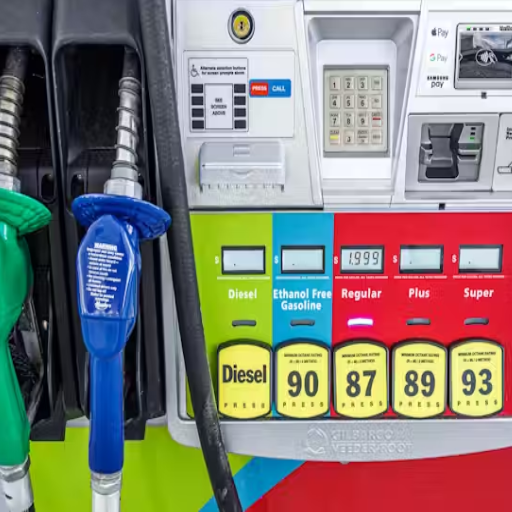
Both gasoline and diesel are standard vehicle fuel options, yet each has unique attributes. Gasoline is generally preferred in most passenger cars because it is marketable and is suited for stock engines. Diesel, on the other hand, is considered to be much more energy-efficient and has a better torque output than gasoline for use in trucks and heavy vehicles. The choice would depend on the vehicle type and the specific engine requirements. While gasoline engines tend to offer a softer and quieter ride, advances in diesel engine technology have made them an excellent choice for durability and fuel economy, especially under heavy loads.
Gasoline vs. Diesel Fuel
Environmental Effects: The environmental impact is an essential criterion when comparing gasoline and diesel. Diesel engines emit comparatively little carbon dioxide (CO2) per mile because they are more energy-efficient than gasoline engines. However, diesel contains more carbon per volume, and diesel engines also tend to be the primary emission sources of nitrogen oxides (NOx) and particulate matter. These emissions contribute to air pollution problems and may cause health effects. On the contrary, gasoline engines produce more CO2 but less NOx and particulates, and are less harmful to local air quality.
Fuel Economy and Cost: Diesel engines are ostensibly more fuel-efficient than gasoline engines- they can carry you farther on less fuel. The latest data suggest that average diesel vehicles offer about 25-30% better fuel economy. Hence, diesel is attractive for longer-distance driving or commercial applications. However, diesel prices fluctuate most of the time and may stay higher than gasoline prices in some regions, thus nullifying any appreciable cost savings earned over time. On the other hand, gasoline vehicles mostly enjoy comparatively low up-front costs and are relatively inexpensive in maintenance, thus making these extremely popular among day-to-day drivers.
Future Trends and Their Alternatives: Due to the shift towards cleaner energy sources, gasoline and diesel are now facing heavy scrutiny. Governments worldwide impose Emissions regulations with greater stringency, paving the way for improvements in fuel technology and engine designs. Hybrid and electric vehicles are also running strong, promising to cut down on the use of fossil fuels in a traditional sense. Further, advances in biofuels, including biodiesel, are helping to close the gap between performance and environmental responsibility, providing options that can work with existing diesel engines.
Understanding Fuel Injectors
Fuel injectors are critical components that allow the precise transmission of fuel into the engine’s combustion chamber, where it is ignited and used for motorized vehicle applications. The fuel injector sprays fuel into the intake port as an atomized mist, allowing the mixture with air to ignite and power the car. Thereafter, the engine’s electronic control unit (ECU) chooses to vary the fuel flow depending on engine speed, load, and temperature parameters.
Advancements in fuel injector technology have vastly improved the efficient atomization of fuel and combustion. Direct injection systems allow fuel sprays to be directly inside the combustion chamber; this application can lead to better fuel efficiency, pollution reduction, and engine power. Studies have found that direct injection systems increase fuel economy by 12-15% compared to the traditional system known as port fuel injection.
High-pressure standard rail injection systems are introduced, operating at pressures as high as 2,500 bar (36,250 psi). These systems allow the best fuel atomization and exact timing for fuel injection, two necessary factors for meeting stringent emissions standards. For example, Euro 6 and Tier 3 have forced an almost full-fledged implementation of these newer fuel injection systems to achieve lower NOx and particulate matter limits.
Another development introduced is the use of improved materials and injector surface coatings capable of extending the service life of injector components even in operating conditions with currently available fuels, including biodiesel blends. These technologies guarantee reliable operation alongside that, and with a nearly doubled range of fuel candidates.
In the future, with injectors still playing a key role in achieving power, research and development are in progress to improve their efficiency further and advance their adaptability, balancing power with sustainability in the face of modern automotive and environmental challenges.
Cost Analysis: Gasoline and Diesel Prices
Global crude oil prices, regional taxation policies, or supply chain disruptions increase the fluctuation of petrol and diesel prices. The average gasoline price has remained around $3.80 a gallon for the past few months in the U.S., while diesel has averaged about $4.50 per gallon in the same period. These numbers indicate a constant disparity between the two fuel types because diesel is more intensively refined and in higher commercial demand.
State-wise variations also matter. For example, some states with high fuel taxes, like California, may have prices upwards of $5 per gallon, while in other states where taxes are low, such as Texas, prices can hover closer to the national average. Changes in seasons can affect these costs in their way: for example, in summertime, higher prices for gasoline along with greater travel are observed; during the colder months, diesel prices rise due to its use as a heating fuel.
Apart from these, geopolitical events comprise lengthy disruptions in oil-producing countries or trade constraints, causing further price fluctuation. Keeping track of these factors is essential for consumers and business industries, with fuel being a crucial commodity budgeted and integrated into the price changes of operations.
Price Factors in Fuel Selection
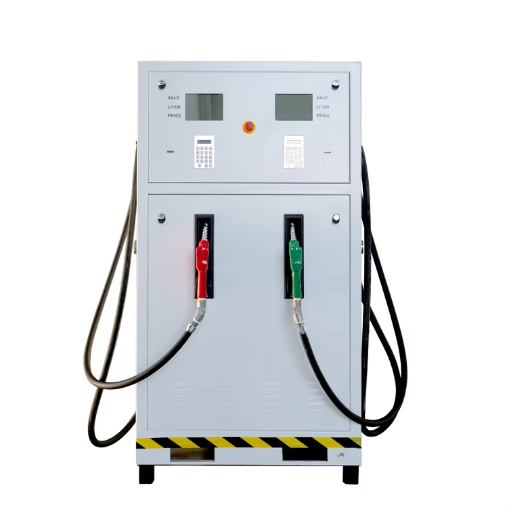
Certain factors are under consideration during price formation for gasoline or diesel storage. Of course, one’s unfavorable crude prices are attributed to the fuel being extracted therefrom. Refining costs for diesel will usually be higher, causing the diesel price to be set differently at the pump. Tax or government regulations might impact fuel prices differently per country. Seasonal demand is yet another factor; in winter, especially, the cost of diesel increases because it is used in heating. Although subsequently under consideration, weighing all these factors about efficiency and your vehicle’s needs can help you make the best decision.
How Fuel Prices are Determined
A series of global, regional, and local factors influence the price of fuel. One of the foremost elements affecting fuel prices is crude oil, the primary raw material for manufacturing gasoline and diesel. International markets determine the cost of crude oil and fluctuate depending on supply and demand, geopolitical situations, and decisions made by major oil-exporting countries, including OPEC.
The second element primarily concerns refining. Crude oil is converted into usable fuels. These conversion processes differ in cost because of the relative complexity of the methods used and where refineries are located. Among the levels of complexity, gasoline is usually simpler than diesel, leading to different costs.
Further, linking distribution and marketing builds up fuel prices. Fuel must be transported from refineries to given localities, and transport expenses may vary with distance, caused by fuel shortages or infrastructural limitations. The expenses of a specific petrol station and marketing could also slightly vary these costs at the consumer end.
Taxes and government policies play a huge role in determining the actual price for the end-user. Executed fuel taxes differ from one country to another, and in fact, even regionally within the same country. For example, federal and state-level fuel taxes noticeably increase consumers’ total costs at gas stations in the United States. Some regions of the world may implement subsidies or tax credits. In contrast, others impose a carbon tax to discourage their use and sale by incentivizing alternatives to fossil fuels.
Seasonal demand also plays a part in the pricing of fuels. In the winter, heating oil production competes with diesel refining and drives the prices upward for diesel in colder months. Similarly, demand for gasoline shoots up in the summer as people hit the roads full throttle, and the prices gradually trickle down to greener pastures.
According to recent market insights, the average gasoline price in the U.S. as of October 2023 is around $3.85 per gallon, which characterizes these factors. This measure highlights crude oil and refining, distribution, and taxation as they appear in different states, thereby representing the complex and dynamic forces that shape fuel prices.
The Impact of Market Trends on Gas Prices
Market trends resolutely impact gas prices, and from my perspective, these include changes in crude oil prices, seasonal demand alterations, and geopolitical event interventions. When oil prices rise due to greater demand or during a holiday season, the cost of gas generally increases along with it. This gives me the insight to foresee a change in price and plan accordingly.
Fees Associated with Mobile Fuel Services
Mobile fuel services represent mobility and flexibility for their clients, but charges generally accompany that convenience. Such charges include delivery fees ranging from $3 to $10 per service, depending on the location and distance covered. Some companies may also charge a flat subscription or membership fee, generally between $20 and $50 monthly, for clients who frequently need deliveries. Alongside service charges, the fuel price per gallon may be slightly higher than traditional gas stations, often by 5-10%, to recoup logistical and operational expenses.
Charges may also vary with the type of service requested. Emergency fueling or deliveries after hours may carry an extra charge of $15 or more. Cities tend to face slight increases in charges due to operational pressures when fuel demand is high or where mobile fuel service availability is scarce. Still, many consumers find that convenience, saving time, and less need to stop at a conventional gas station balance well beyond the extra charge. Most reputable providers disclose pricing details openly so customers can select the option best suited for their fuel requirements.
Reference Sources
“Geolocation-Based Air Pollution Mobile Monitoring System” (2021)
“Tetraethyllead (TEL) in Gasoline as a Case of Contentious Science and Delayed Regulation” (2020)
Frequently Asked Questions (FAQs)
Q1: Is mobile gas as effective as traditional gas stations?
A1: Mobile gas is designed to meet the same quality standards as fuel from traditional gas stations. It often undergoes strict testing processes to ensure optimal performance and efficiency.
Q2: Does using mobile gas affect vehicle performance?
A2: Mobile gas typically does not negatively impact vehicle performance when sourced from reputable providers. It is formulated to support efficient combustion and maintain engine health.
Q3: Are there additional costs associated with mobile gas services?
A3: While mobile gas services may include convenience fees, many providers offer competitive pricing that offsets these costs. Service providers often detail any additional fees upfront for transparency.
Q4: How does the quality of mobile gas compare to top-tier gas?
A4: Reputable mobile gas providers often supply fuels that adhere to or exceed top-tier standards to ensure they meet consumer and environmental expectations.
Q5: Is mobile gas safe and reliable for long-term use?
A5: Mobile gas is safe for long-term use as long as it is sourced from trusted suppliers. Proper storage and handling practices ensure its reliability and safety for consumers.

